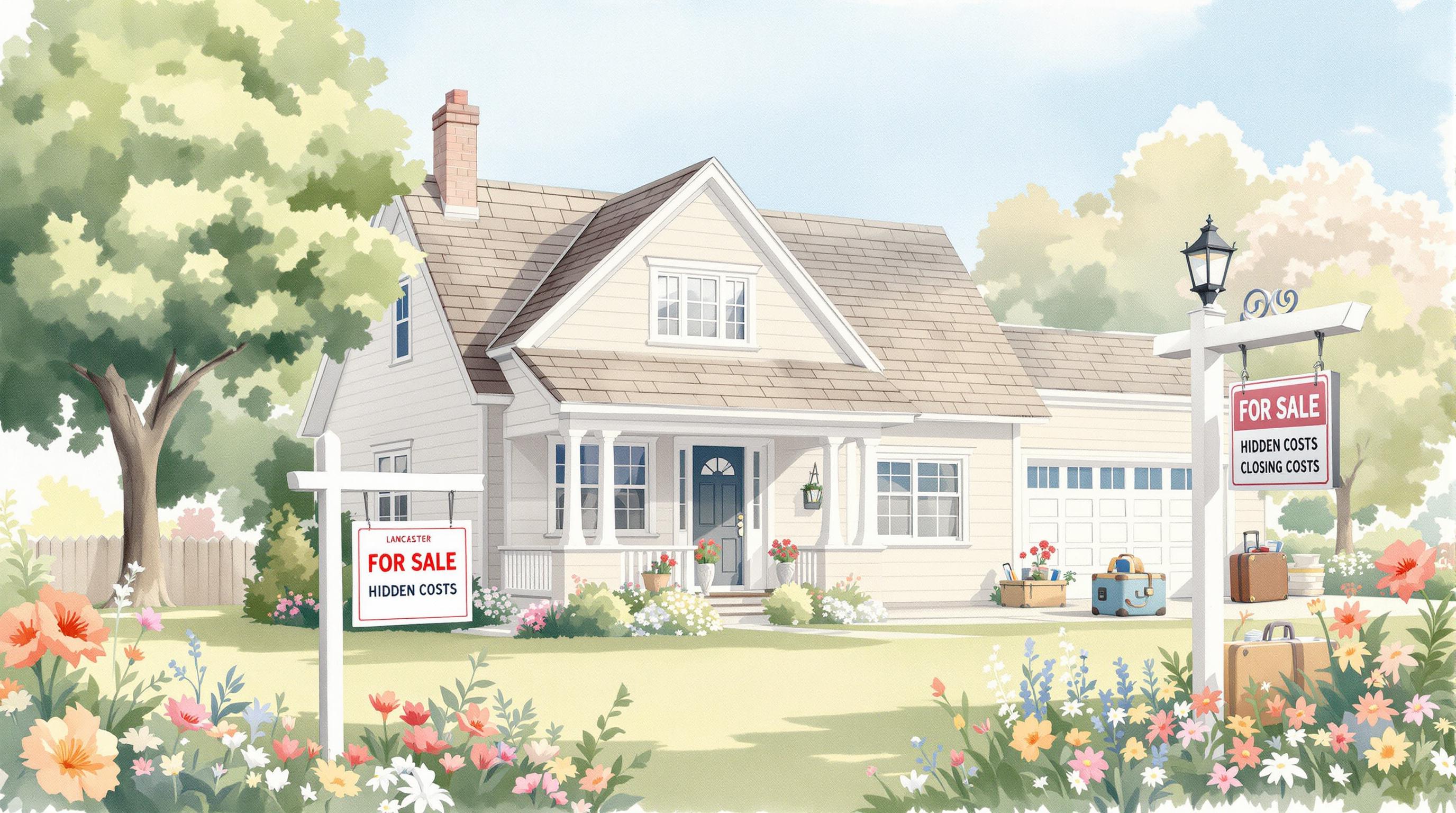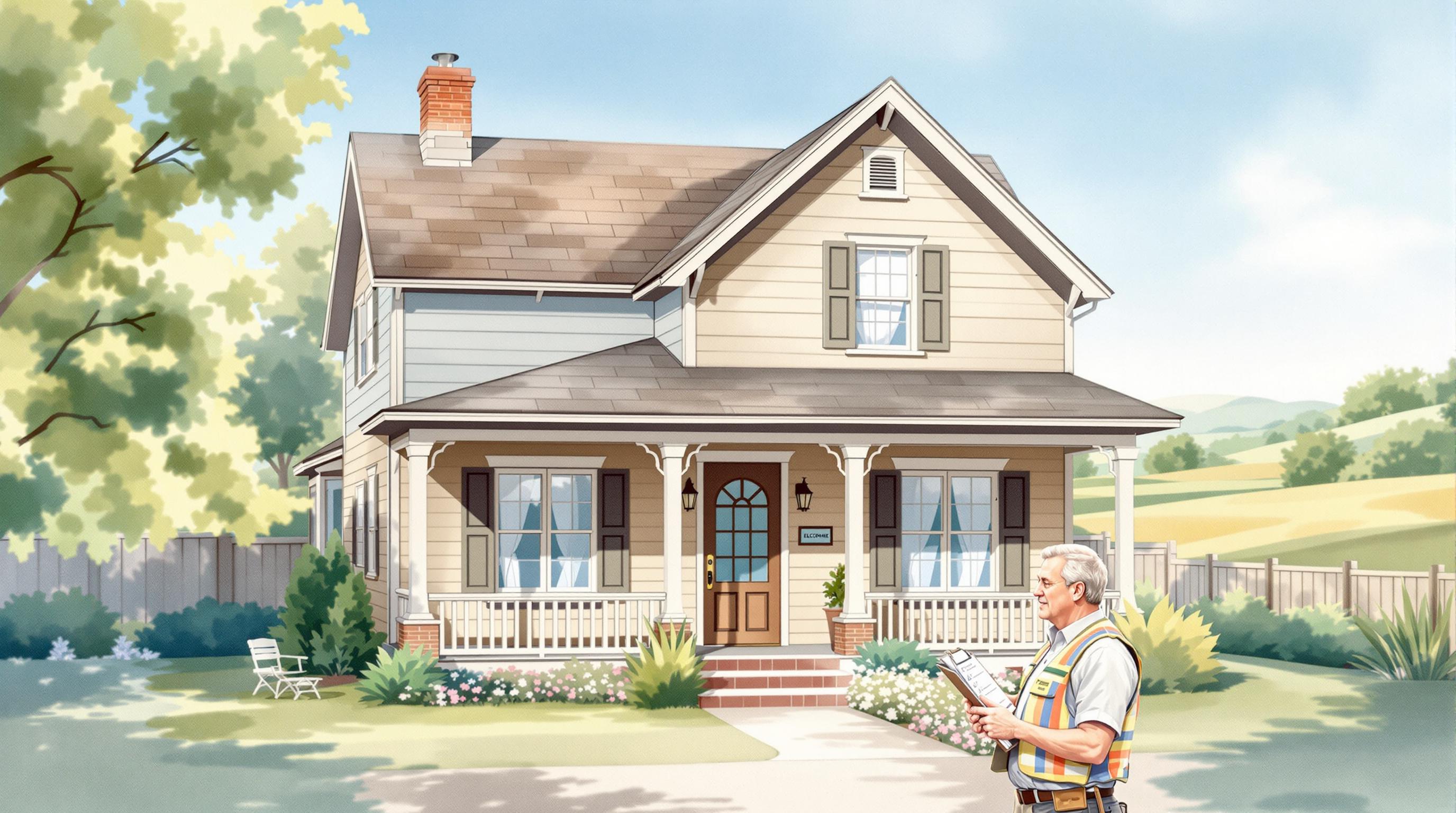Preparing for a home inspection in Harrisburg? Here's what you need to know:
- Focus Areas: Inspectors often check for foundation stability, moisture damage, radon levels, and aging systems, especially in historic homes.
- Key Steps: Gather documents like maintenance records and seller disclosures, ensure access to utilities and systems, and address minor repairs beforehand.
- Inspection Process: Expect a 2-4 hour review covering electrical, plumbing, HVAC, and structural components. Seasonal factors like humidity or snowmelt might influence findings.
- Costs: Standard inspections range from $325-$425, with add-ons like radon testing (~$150) or mold inspection (~$450) for older homes.
- Negotiation Tips: Focus on critical issues like safety hazards or structural concerns, and consider requesting repair credits for faster resolutions.
Proper preparation helps you identify issues, negotiate effectively, and make informed decisions. Keep reading for detailed checklists, common problems, and local insights.
Home Inspection: What to Expect, Tips for Buyers
Home Inspection Process in Harrisburg
If you're buying a home in Harrisburg, it’s important to understand how the inspection process works. Most inspections take between 2 to 4 hours to complete [1].
Pennsylvania Inspection Requirements
In Pennsylvania, home inspections follow specific standards that buyers should be aware of. Here's what a typical inspection covers:
- Electrical, plumbing, and HVAC systems
- Roof condition and exterior features
- Safety systems and potential hazards
Additionally, sellers are required to fill out a disclosure form that lists any known defects in the property [3]. Many lenders also require additional checks, such as radon testing, termite inspections, and reports on the condition of major systems [6].
These requirements set the stage for the pre-inspection steps we'll discuss next.
Common Issues in Harrisburg Homes
Harrisburg’s humid climate brings its own set of challenges, making seasonal inspections especially important. Inspectors in the area use advanced tools to detect problems that might otherwise go unnoticed.
| Common Problem | Typical Cause | Impact |
|---|---|---|
| Elevated Radon | Geographic Location | Health risks requiring mitigation |
Local inspectors often rely on thermal imaging to find hidden moisture and drones to assess roofs. These tools help confirm any suspected issues during the inspection [1].
Seasonal changes also affect what inspectors focus on. For example, spring inspections often check for water damage caused by melting snow, while winter inspections look closely at heating system performance [2]. These targeted approaches ensure thorough assessments tailored to Harrisburg's climate.
Pre-Inspection Checklist
To address common inspection concerns in Harrisburg, use this checklist to get your property ready:
Key Documents to Gather
Make sure these documents are organized and easy to access:
| Document Type | Purpose |
|---|---|
| Seller's Disclosure | Details any known property issues |
| Maintenance Records | Provides a history of repairs |
| Utility Bills | Shows energy and water usage trends |
| Permits & Warranties | Confirms completed improvements |
Preparation Priorities for Your Property
Take these steps to ensure your property is ready for inspection:
-
Foundation and Basement
- Note any visible cracks or water stains.
- Clear pathways to all foundation walls for easy inspection.
-
Electrical Systems
- Check the manufacturing date on the electrical panel.
- Identify and document any outlets that aren’t working.
-
Potential Environmental Issues
- Record details about any radon mitigation systems already in place.
Ensuring Easy Access for the Inspector
Make sure the inspector has clear access to the following areas:
| Area | Preparation Needed |
|---|---|
| Utilities & Systems | Ensure all systems are working; leave 3-4 ft of space around HVAC, water heater, and electrical panels. |
| Storage Areas | Move items away from walls in the basement, attic, and garage. |
| Exterior | Trim vegetation to allow access to the foundation, roof, and gutters. |
Important: Turn on all utilities and light pilot lights before the inspector arrives. This ensures they can test everything without delays [6].
Lastly, complete basic maintenance tasks like replacing lightbulbs, cleaning gutters, ensuring detectors work, and fixing plumbing leaks. These efforts make it easier for the inspector to perform a thorough evaluation and help you move smoothly to the next step of attending the inspection.
During the Inspection
Once you've completed your pre-inspection prep, it’s time to focus on making the most of the inspection itself. This phase is all about understanding the property's condition and gathering key insights.
Buyer Attendance Tips
Being there during the inspection gives you a chance to learn more about your potential new home. Here’s how to make your time count:
| Time Period | Suggested Actions |
|---|---|
| Before Inspector Arrives | Show up early with a notebook and flashlight to prepare for the process. |
| During Main Inspection | Stay nearby to listen, but avoid interrupting the inspector while they work. |
| System Testing Phase | Pay close attention to tests on major systems like HVAC, plumbing, and electrical setups. |
| Final Walkthrough | Use this time to ask prepared questions and discuss the inspector’s major findings. |
Focus your questions on structural and mechanical systems rather than minor cosmetic issues. It’s a good idea to ask about maintenance needs and potential repairs. However, save detailed questions for the end of each section so the inspector can work without disruption.
Standard Inspection Tests
Home inspections in Harrisburg often involve advanced tools and techniques to ensure a thorough evaluation of the property.
Visual and Physical Tests:
- Assessing the foundation using moisture meters to check for water damage.
- Examining electrical systems with circuit analyzers to identify safety concerns.
- Testing plumbing, including water pressure checks (ideal range: 40-80 PSI).
- Inspecting HVAC systems to ensure proper operation across all zones.
For older homes, especially in Harrisburg’s historic districts, inspectors may include additional checks, such as:
- Evaluating the condition of original building materials.
- Reviewing the quality of past renovations.
- Checking for code compliance issues.
- Identifying hazardous materials like lead paint or asbestos.
Central PA Realty agents often assist buyers by interpreting inspection results, especially for historic homes. They use local market knowledge to help you understand how findings align with trends in the area [2][6].
sbb-itb-7fa5722
After the Inspection
After reviewing the inspector's findings with your agent, it's time to prioritize repairs based on their urgency. In Harrisburg's real estate market, knowing how to interpret and act on inspection results is key to making informed decisions.
Critical vs. Minor Repairs
Distinguishing between critical and minor issues helps you address repairs efficiently. In Harrisburg, critical problems often demand immediate attention due to safety risks or possible structural damage.
| Issue Type | Examples | Average Local Cost | Priority Level |
|---|---|---|---|
| Critical | Structural foundation shifts, major electrical hazards, severe roof damage | $5,000+ | Immediate action |
| Significant | Aging HVAC system, plumbing leaks, water damage | $1,000-$5,000 | Address within 1-3 months |
| Minor | Cosmetic flaws, minor paint issues, loose fixtures | Under $1,000 | Address over time |
Repair Negotiation Guide
When negotiating repairs in Harrisburg, focus on issues that impact safety and functionality. Data shows buyers often negotiate between $5,000 and $7,000 in repairs or credits based on inspection findings [2][5].
"The most successful negotiations focus on safety and structural issues rather than cosmetic concerns. In Harrisburg's current market, buyers who prioritize their requests and support them with professional estimates typically achieve better outcomes", says a Central PA Realty representative [4].
To negotiate effectively:
- Get Professional Quotes: Use licensed contractors as outlined in pre-inspection checklists.
- Focus on Key Issues: Stick to the top 3-5 critical problems.
- Consider Credits: Requesting closing cost credits instead of repairs can speed up the process.
This approach aligns well with Harrisburg's inspection-driven market trends.
When to Call Specialists
Specialists are crucial when dealing with specific issues like radon levels exceeding EPA guidelines or historic properties needing compliance checks. Their expertise can help buyers negotiate repairs, which have averaged $8,000 in recent transactions [4].
Harrisburg Home Inspection Resources
After identifying repairs, finding the right professionals is crucial. For Harrisburg buyers, understanding local services and resources is key. Data shows thorough inspections can save homebuyers between $5,000 and $10,000 in unexpected repair costs [5].
Choosing an Inspector
Pennsylvania doesn’t require state licensing for home inspectors, but professional certifications can reflect their skills and adherence to industry standards.
| Certification Type | Advantages | Requirements |
|---|---|---|
| ASHI Certified | Recognized standards, experience with flood-prone areas | 250+ inspections, passing exam |
| InterNACHI | Online tools, ongoing education, local knowledge | 100+ hours of training |
| Independent Local | Specific market expertise, flood zone focus | Varies by inspector |
Steps to verify an inspector:
- Review at least three sample reports
- Confirm they have E&O insurance
- Check five or more local references
- Ensure they have experience with historic homes and flood zones
"The most successful home inspections in Harrisburg come from professionals who understand our unique housing stock, particularly the challenges of our historic districts and river-proximity properties", says a representative from the Pennsylvania Association of Realtors [7].
Central PA Realty Services

Central PA Realty connects clients with certified inspectors across Cumberland, Dauphin, and nearby counties. For properties in flood-prone areas near the Susquehanna River, their team organizes detailed inspections tailored to common Harrisburg issues like foundation settling and water damage [6].
Their offerings include:
- Pre-inspection consultations
- Coordination with specialists for flood zones
- Digital repair estimates
- Support during negotiations
They also provide guidance for moisture-related inspections and can recommend experts familiar with local water table concerns [6].
Summary
For a successful home inspection in Harrisburg, it's essential to focus on key local concerns: foundation stability, moisture management, and outdated systems, especially in older homes. Be sure to gather maintenance records, provide 3-4 feet of access around critical systems like furnaces and electrical panels [6], and document any known issues before the inspection.
Harrisburg's unique housing challenges require buyers to pay extra attention to foundation issues caused by local soil conditions and moisture problems, particularly for properties near the Susquehanna River. Addressing these concerns during preparation, testing, and negotiation can help buyers make informed decisions.
Clear access to inspection points is critical. Ensure pathways are open and maintain a 3-4 foot workspace around essential systems [6]. This small preparation step can save time during the typical three-hour inspection.
Buyers should focus on the following:
- Spotting foundation and moisture concerns
- Assessing electrical and plumbing systems
- Documenting current property conditions
- Planning for necessary repairs
Major structural and safety issues should be prioritized during negotiations to align with Harrisburg's inspection-driven real estate market [2][3]. This organized approach helps buyers make the most of their inspection findings while navigating the local market effectively.
FAQs
How much does a home inspection cost in PA?
In Harrisburg, a standard home inspection usually costs between $325 and $425 [1]. The price depends on factors like the size of the home:
| Home Size (sq ft) | Typical Cost |
|---|---|
| Under 2,000 | $300-$350 |
| 2,000-3,000 | $350-$400 |
| 3,000-4,000 | $400-$450 |
| 4,000-5,000 | $450-$500 |
You might also need additional inspections, especially for older homes in the area. Some common add-ons include:
- Radon testing: Around $150
- Mold inspection: About $450
- Sewer scope: Approximately $200
For cost savings, consider scheduling inspections during the off-peak months (November through February) [2]. While Central PA Realty doesn’t offer inspections directly, they can connect you with experienced local inspectors who understand Harrisburg’s housing quirks, such as moisture-related issues.
Home inspections cover all major systems and components, helping you spot potential problems before buying. Check out the recommended resources above for trusted inspectors in the area.



